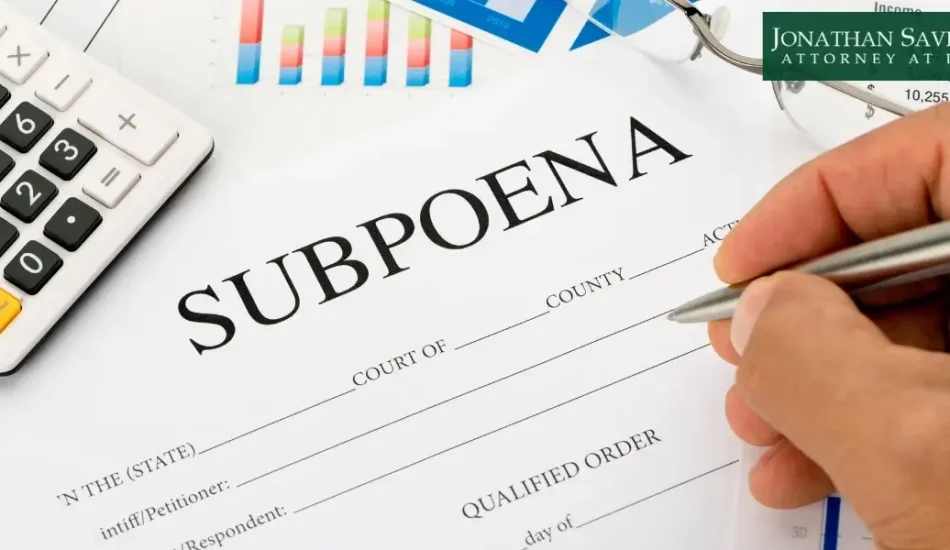|
|
Last Modified on Nov 10, 2024
A subpoena is a powerful legal tool used to compel individuals to testify, produce documents, or provide evidence in legal proceedings. These documents are essential to courts and attorneys, as they can secure the information they need to pursue justice and resolve disputes. If you are involved in a criminal case or civil litigation, you should understand the basics of New York subpoena rules so you can comply with state laws.
What Are Subpoenas, and Why Do They Matter?
A subpoena is a legally binding document issued by a court, attorney, or administrative agency that requires someone to perform a specific action. This might include appearing in court, producing documents, or providing testimony under oath.
Subpoenas have a vital role in legal proceedings, enabling critical evidence or witness testimony to be available when resolving disputes or enforcing the law. They are often seen as the core aspect of the discovery process in both civil and criminal cases.
In New York, subpoenas are governed by the Civil Practice Law and Rules (CPLR) and must adhere to specific procedures to be valid. A properly issued subpoena ensures fairness and transparency in legal matters, making them indispensable in pursuing justice.
How Are Subpoenas Issued and Served in New York?
In New York, subpoenas can be issued by attorneys involved in a legal case, courts, and certain administrative agencies. Attorneys may issue subpoenas without prior court approval, provided they are connected to an ongoing case. Self-represented litigants, however, must seek court permission to issue a subpoena. This makes sure the subpoena is relevant and within the bounds of the law.
Serving a subpoena correctly is critical to its enforceability. In most cases, subpoenas must be delivered in person to the individual named in the document. This direct service enables the recipient to be fully aware of their legal obligation. However, in certain circumstances, alternative methods — such as leaving the subpoena with a responsible adult at the recipient’s residence — may be permissible.
In New York, subpoenas must be served by a person who is at least 18 years old and not a party to the case. Professional process servers are often used to ensure compliance with these rules. Along with the subpoena, the server must provide the required fees for travel and attendance to comply with New York law. Failure to meet these procedural requirements can render the subpoena invalid and unenforceable.
Consequences of Noncompliance With a Subpoena
Ignoring or failing to comply with a subpoena in New York can have serious legal consequences. The court may issue a contempt charge against the non-compliant party, which can result in fines, penalties, or even jail time in extreme cases. For businesses or professionals, noncompliance may also damage their credibility and reputation, especially if the matter involves sensitive or high-profile cases.
Noncompliance could lead to additional legal actions, such as enforcement proceedings or sanctions, which may further complicate your case and increase financial or reputational risks.
If complying with a subpoena is impossible due to undue burden, irrelevance, or other valid reasons, the recipient has options. They can file a motion to quash or modify the subpoena with the court, asking for relief from the obligations outlined in the document.
FAQs
Q: What Steps Are Needed to Enforce a Subpoena in New York?
A: To enforce a subpoena in New York, you must first make sure it has been properly issued and served. If the recipient fails to comply, you can file a motion with the court to compel their compliance. The court may then issue an order requiring the individual to respond to the subpoena. Persistent noncompliance can lead to contempt of court charges, fines, or other legal penalties.
Q: What Happens If You Don’t Comply With a Subpoena in NY?
A: Failing to comply with a subpoena in New York can result in serious legal consequences. The court may issue a contempt charge, which could lead to fines, penalties, or even jail time. Noncompliance also risks damaging your credibility in court or with legal authorities. It’s essential to consult an attorney to explore options, such as filing a motion to quash, if compliance is not possible.
Q: Does a Subpoena Have to Be Served in Person in New York?
A: In most cases, a subpoena in New York must be served in person to be valid. This makes sure the recipient is properly notified of their legal obligation to comply. Service may involve delivering the document directly to the individual or leaving it at their residence with a responsible adult. Incorrect service can make the subpoena unenforceable, so strict adherence to legal procedures is crucial.
Q: What Makes a Subpoena Invalid in NY?
A: A subpoena in New York can be invalidated for several reasons. Common issues include improper service, lack of jurisdiction, or failure to provide sufficient notice. Subpoenas that are overly broad, irrelevant, or unreasonable may also be challenged and quashed by the court. Making sure the subpoena complies with all legal requirements is key to avoiding disputes or enforcement issues.
Q: Who May Issue a Subpoena in New York?
A: Several entities may issue a subpoena in New York. Courts and specific administrative agencies can issue a subpoena. An attorney can also issue a subpoena, but the attorney in question must be directly involved in the case to do so. An individual who self-represents is allowed to issue a subpoena, but they must first obtain court permission.
Schedule Your Subpoena Consultation Today
Subpoenas can be complex and intimidating. Whether you need to issue a subpoena, respond to one, or challenge its validity, having experienced legal guidance can make all the difference. The trusted legal team at the Law Office of Jonathan Savella is dedicated to helping clients navigate the law with clarity and confidence.
Don’t leave your case to chance. Whether you have received a subpoena, need information about your rights and options, or wish to have someone subpoenaed, we’re here to help. Contact our office today to schedule your subpoena consultation and take the first step toward resolving your legal matter.





